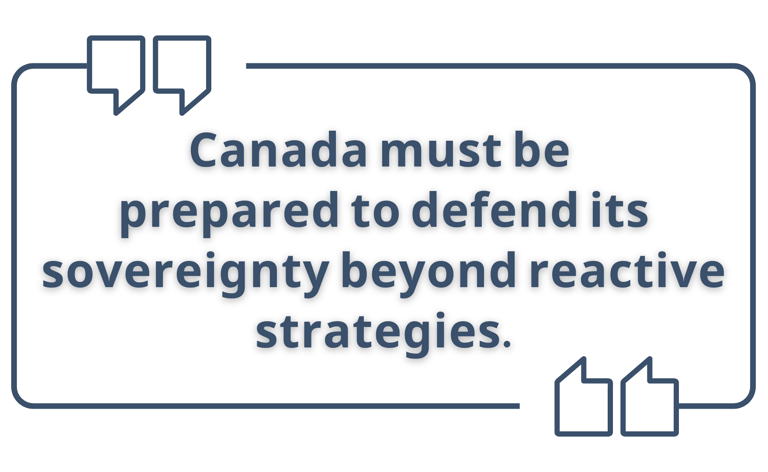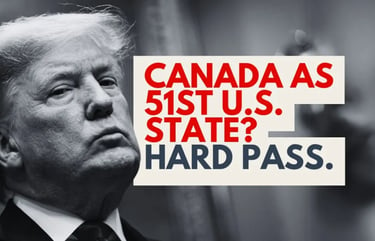Upholding Canadian Sovereignty Amid Rising U.S. Pressures
Political Opinion
By Omar Alsheikh
1/7/2025


Upholding Canadian Sovereignty in Turbulent Times
Canada’s relationship with the United States has long been characterized by deep economic ties, cultural affinities, and shared defense interests. Yet, as highlighted by recent developments—including Donald Trump’s proposed 25 per cent tariffs on Canadian goods, his insistence on mass deportations from the United States, and the ongoing scrutiny of Canada’s trade surplus—Canadian policymakers increasingly face the question of how to protect the nation’s sovereignty in a climate where U.S. policy can shift rapidly. Despite Prime Minister Justin Trudeau’s efforts to manage these challenges, intensifying internal pressures and the fear of damaging Canada-U.S. relations further have positioned him on precarious ground, raising the possibility of his resignation. This essay examines Canada’s need to maintain its independence in the face of U.S. demands and outlines how current tensions may accelerate a political realignment in Ottawa.
The Imperative of Canadian Sovereignty
Canada’s sovereignty stems not only from its constitutional framework and parliamentary traditions but also from its ability to chart independent courses in foreign and domestic policy. In periods of U.S. volatility—as under the Trump presidency—this autonomy is tested. Trump’s repeated declarations to impose steep tariffs on Canadian goods, seen by many analysts as a bargaining chip rather than a measured policy, threaten to hobble Canada’s economy. This is particularly problematic given the two countries’ integrated supply chains: an abrupt spike in tariffs would risk job losses on both sides of the border and disrupt numerous industries, including automotive, dairy, and technology.
Moreover, Canada’s sovereignty is further challenged by the potential influx of migrants fleeing the United States amid Trump’s vow to launch the “largest deportation program in American history.” Beyond the immediate logistical and humanitarian concerns of accommodating new arrivals, Canadian authorities must reckon with the impact on border security and resource allocation. Failing to address this situation with a proactive strategy could ultimately erode Canada’s reputation for robust immigration policies and undermine public confidence in the government’s capacity to manage major cross-border movements.
The Fallout for Trudeau’s Leadership
While Prime Minister Justin Trudeau has attempted to balance diplomatic engagement with a stance of cautious self-assertion, he faces acute pressures from within his own party. Indeed, a major theme of recent developments is the “caucus insurrection” that suggests even those in Trudeau’s inner circle question whether his measured approach to the Trump administration is sufficiently protective of Canadian interests. Fearful that an emboldened White House could exact punitive economic measures at any moment, Liberal Party members have grown increasingly vocal about the need for a more assertive or, alternatively, a more adaptive strategy.
Should Trudeau be seen as unable—or unwilling—to counter Trump’s threats effectively, resignations or leadership challenges become more likely. Such scenarios expose a rift in the ruling party between those favoring a firm nationalistic posture against U.S. demands and those prioritizing diplomatic conciliation. The result is a political climate in which Trudeau’s hold on power is in question, particularly if his caucus becomes convinced that new leadership could reset relations or negotiate from a position of greater strength.


Economic and Security Ramifications
The tight interdependence of the Canadian and American economies is a core concern as policymakers navigate these tensions. Canada’s trade surplus with the United States, for instance, has long drawn ire from certain U.S. administrations, most recently that of Donald Trump. To forestall serious repercussions, analysts have proposed that Canada might increase purchases of U.S.-made military equipment—such as Arleigh Burke-class destroyers or underwater drones—both to bolster national defense and to signal reciprocity in economic relations. While these measures could provide short-term relief from tariff threats, they also raise the question of whether offsetting the trade imbalance through large military procurements compromises long-term autonomy.
On the security front, calls for a closer alignment between Canadian and U.S. terrorism watchlists, as well as heightened vigilance at the border, highlight the delicate balance between respecting Canada’s unique policy environment and demonstrating commitment to continental defense. A too-accommodating posture could, however, diminish Canada’s independent stance on immigration and civil liberties—areas where Canadian values and practices have historically diverged from those south of the border.
Charting a Path Forward
As Ottawa contemplates how to navigate an unpredictable U.S. administration, one overarching principle emerges: Canada must be prepared to defend its sovereignty beyond reactive strategies. This means developing coherent contingency plans for trade disruptions, managing asylum seekers responsibly and humanely, and ensuring that defense procurements serve Canadian interests rather than merely mollifying Washington. Collaboration with the private sector, particularly in areas such as technological innovation and Arctic security, can fortify Canada’s competitive edge without sacrificing core values of independence and multilateral engagement.
Concurrently, political realities suggest that Prime Minister Trudeau may face increased pressure to step aside if he is perceived as unable to safeguard Canada’s interests adequately. While such a development could exacerbate short-term uncertainties, it might also pave the way for a leader or government more inclined to assert a firmer stance vis-à-vis U.S. demands. Whether that leader would choose confrontation or more deft diplomacy, the objective remains the same: Canada must ensure that any partnership with the United States arises from mutual respect and shared benefits, rather than fear of protectionist reprisals.
Sovereignty Above All
The intensifying challenges in Canada-U.S. relations underscore a fundamental truth: Canada’s sovereignty is non-negotiable, irrespective of whether the White House is occupied by Donald Trump or another U.S. president. The overlapping crises—proposed tariffs, possible surges in asylum seekers, and deep concerns about Canada’s perceived inaction on border security—threaten not only to undermine Canada’s economic stability but also to distort the country’s policy priorities in ways that run contrary to public sentiment and national values. Under these circumstances, Prime Minister Justin Trudeau’s leadership has come under scrutiny within his own ranks, raising the prospect of his resignation as a catalyst for policy recalibration. Ultimately, Canada’s best path forward lies in steadfastly protecting its independence, while remaining flexible and pragmatic in the face of ever-shifting geopolitical realities. By doing so, Canada can sustain its enduring partnership with the United States on its own terms—terms that champion national sovereignty, economic resilience, and the common good.


